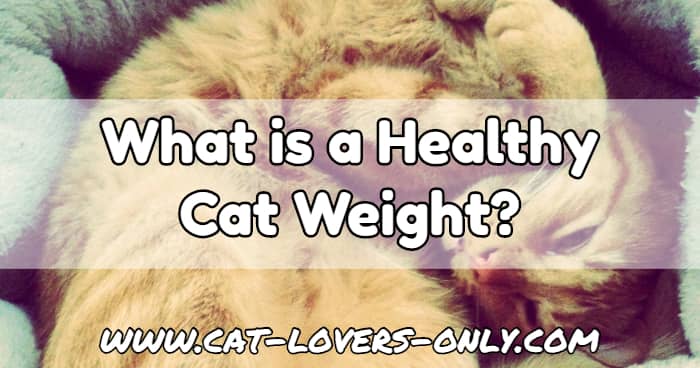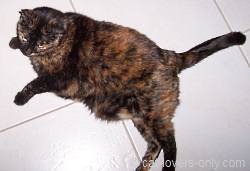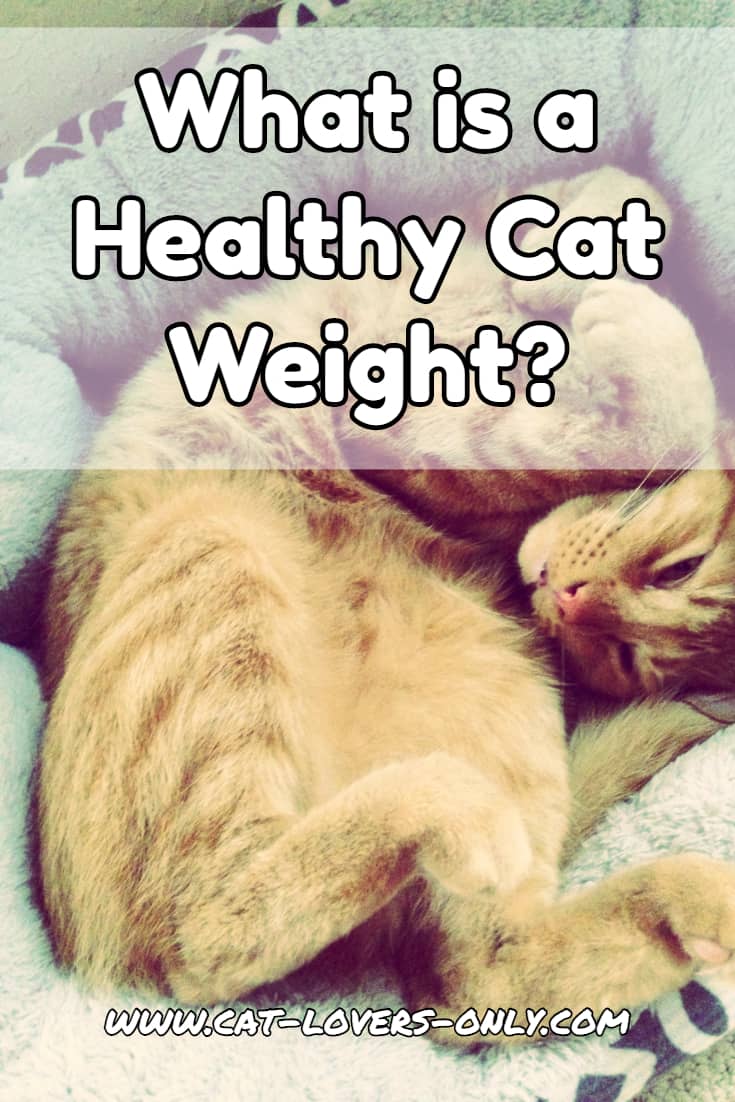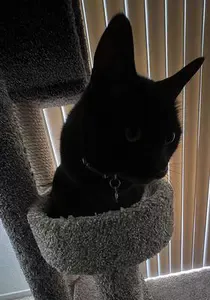What is a Healthy Cat Weight?
Maintaining a healthy cat weight is a significant wellness issue, and overweight cats are a common problem reported by veterinarians.
Just as in humans, overweight cats may develop weight related illnesses and medical conditions, so it's important to help your cat stay slim and trim.
Some vets are saying that obesity in cats is epidemic, reporting that many of their feline patients are overweight or obese.

While weight loss in cats is a health problem that may have a number of causes, most of the time the discussion surrounding achieving a healthy cat weight centers on overweight cats.
 Teddie showing her obvious weight problem
Teddie showing her obvious weight problemA while back, I responded to a post on a popular cat forum when a question was asked about how to help an obese cat lose weight.
Once upon a time, my own cat Teddie was a porker, and it was clearly my fault.
At one point, Teddie was over 15 pounds. While she's got a good size frame, this was a couple of pounds above her ideal weight.
I was able to help Teddie slim down, and a summary of my suggestions that I gave on that forum is below.
Definition
So just what is a healthy cat weight? How do you define it?
Eizabeth Hodgkins, DVM, author of Your Cat: Simple New Secrets for a Longer Stronger Life wrote in Feline Wellness magazine that the average healthy cat weight is nine to eleven pounds.
If your cat is more than this average, then she may be overweight.
Remember that a cat whose ideal weight is 12 pounds (a big cat), but is currently 15 pounds is 25 percent overweight. Imagine a 100 pound woman who adds 25 pounds, or a 175 pound man who gets up to 218 pounds.
Of course, this depends on the cat's frame as well. You may have seen a cat weight chart at the vets office depicting the ideal cat body type versus a cat that is either too slim or too heavy.
This chart gives you a visual idea of whether or not your cat is overweight. It can also help you in getting quick visual confirmation that your weight loss efforts are working.
Charts work regardless of a cat's frame size. Whether your cat is larger, like a Maine Coon or Ragdoll, medium sized, like a Persian, or small, like the tiny Singapura.
Using the chart, you'll know whether your weight loss methods are working. You'll be able to keep your cat at an ideal weight, and in so doing, reduce health risks.
What Are The Risks?
There are a number of health risks associated with being an overweight kitty, of course, just as in humans.
For younger cats, gaining weight early may set a tone for the kitty's entire life, increasing the risk of developing certain illnesses over time. Later in life, existing illnesses can be exacerbated by excess weight.
Specifically, overweight kitties may experience elevated risk of diabetes, cardiovascular and respiratory problems, and a shorter lifespan. There are also increased risks of cancer.
Overweight cats may be more likely to develop joint problems, and those with arthritis may experience more pronounced symptoms.
Most cats will, at some point, need to go under anesthesia, if nothing else, for dental cleaning. Anesthesia is always risky, but a heavy cat is in even more danger from just a routine dental cleaning.
Truly obese cats may suffer from mobility problems, including grooming issues, which may lead to other health issues.
Even people who seem to know how important a healthy cat weight is to a longer healthier life for their kitties sometimes don't seem to take this issue seriously.
I hear people who have fat cats saying things like "my cat is just lazy" or "my cat isn't interested in toys." Clearly these cats don't get enough exercise.
"All he wants to do is eat" is another common complaint. And likely, these cats are overfed, understimulated, bored, and at higher risk of obesity and related issues.
What Cats Are At Risk?
While no cat is immune to becoming heavy, weight gain often strikes indoor only cats, cats with mobility problems or other health issues.
Cats with mobility problems simply can't be as active as necessary, and there are other health conditions that may cause weight gain.
Indoor only kitties may not be getting enough exercise, and probably spend much of their time soaking up sun puddles, and eating.
Speaking of eating, some veterinarians recommend against dry cat food due to the high carbohydrate content. Other cats are simply overfed, and don't have a high enough activity level.
Many cat health experts are saying that a healthy cat weight is impossible to maintain if you feed free choice. Free choice means that your cat has no set meal time. Instead, you set out some dry food, and let your cat have at it throughout the day and night.
The Fix And My Tips
The good news is, that in many cases, achieving and maintaining a healthy cat weight is not that difficult.
An otherwise normal, healthy cat can lose weight by doing two simple things: eating fewer calories, and exercising more. Surprise!
If you have an overweight or obese cat, the first step is to get your cat to the vet and make sure that nothing else is wrong, and that she's healthy enough to exercise and reduce calorie intake.
Get a diet recommendation from your vet, and go from there. Here's what worked for Teddie and others.
At that point, you can:
- Set up two play sessions with your cat daily. Get an interactive toy, and exercise your cat for about 15 minutes at each session. This will increase calorie burn, and reduce boredom.
- Reduce your cat's food intake based on your vet's suggestions. Your vet may recommend a diet change, such as switching from dry food to wet food.
- Use set mealtimes, rather than free choice feeding. This puts you in control of your cat's food consumption.
- Use the vertical space in your home to force your cat to exercise. Climbing furniture, where your cat has to climb up and down in order to get to a resting spot, is ideal. This will force your cat to get more exercise than normal.
- Place water bowls in the elevated areas of the house to encourage your cat to both drink more water, and get some exercise in the process.
- For achieving and maintaining a healthy cat weight, a rotating mix of cat toys will keep your kitty coming back to exercise.
Cautions And Precautions
Different cats have different tolerance and fitness levels, and many have short attention spans.
If your cat doesn't enjoy the exercise sessions, she'll be less likely to participate. Make it fun and play to your cat's likes and instincts.
With that in mind, don't overwork your cat during the exercise sessions. Cats are made for sprints, not marathons, and 15 minutes is usually plenty.
Overweight cats may tire easily, so let your cat set the pace, and work up to longer sessions. Ideally, two 15 minute sessions every day is desired. But, in the beginning it may be better to have five minute sessions six times a day.
For extremely heavy cats, it may be enough that your cat lay there and take swats with her paws at a feather toy until she gets into better shape. You can't be a couch potato one day and run a marathon the next. Again, work up to it.
Don't switch your cat's diet too quickly. Instead, change your cat's diet like you change your cats litter, slowly over time.
Don't do any of this without clearing it with your vet first. If your cat suffers from an unknown medical condition, or is not healthy enough to reduce calorie intake (possibly dangerous for diabetic cats, for example), you'll risk your cat's health.
Losing weight too quickly or not eating can be dangerous for your kitty. Overweight cats can suffer from feline hepatic lipidosis, also called fatty liver disease. This is one reason why it's important to do a health check with your vet.
With Teddie, the vet said she was definitely overweight, but otherwise healthy. I started playing with her more often, and got her to exercise with me several times a day. Since there were three cats in the house at the time, it was difficult to control the eating, so her diet stayed the same.
She was about ten years old at the time, and it only took a few months of exercise sessions for her to slim down quite a bit. Not bad for a ten year old kitty!
Now, go play with your cat!
Cat Health Questions
Cat Lovers Only



Comments: What do you think?
Have your say about what you just read. Leave me a comment in the box below.